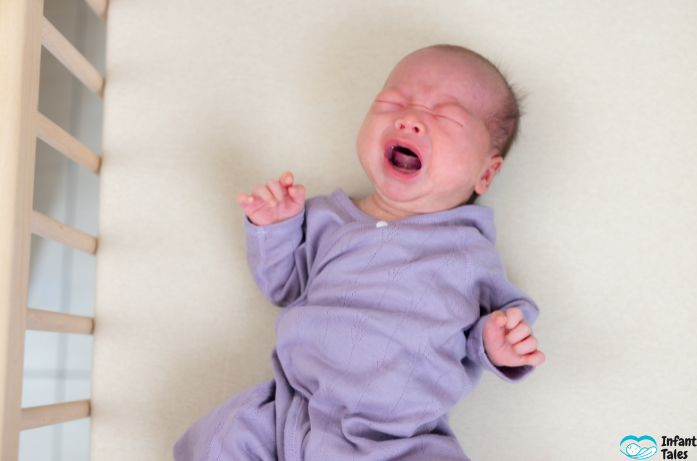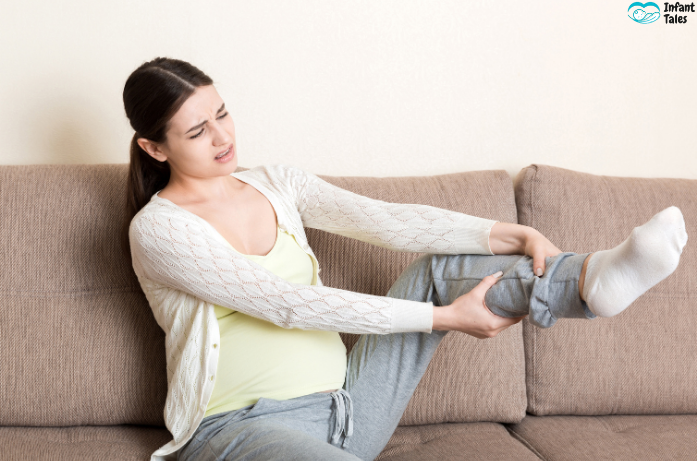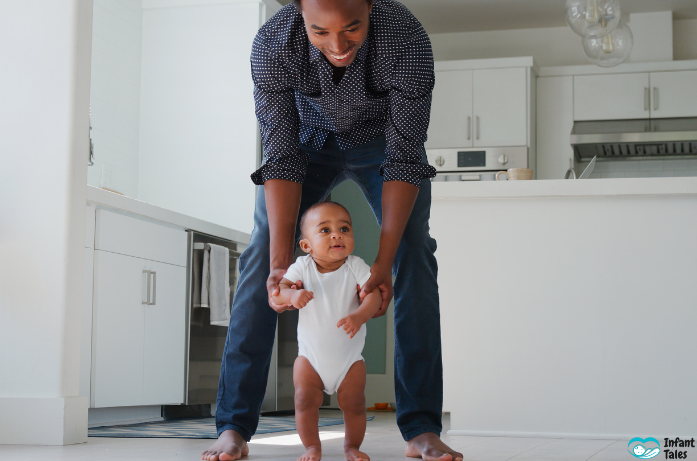By a Caring Mom at Infant Tales
It is midnight, and suddenly the silence is broken by the sound of your baby crying, just as you were going to enjoy a few moments of peace. You run to the baby’s room to find that your little one has not woken up yet, the face is calm, but the cheeks are wet from tears, Baby Crying in Sleep.
Stay calm and accept this information: Crying in your sleep is common and usually nothing to worry about. Babies’ brains are still developing, their sleep habits are subtle, and they experience emotions they can’t yet express in words. This Infant Tales guide will help you understand the causes of this phenomenon, when to worry, and how to gently soothe your baby back to sleep.
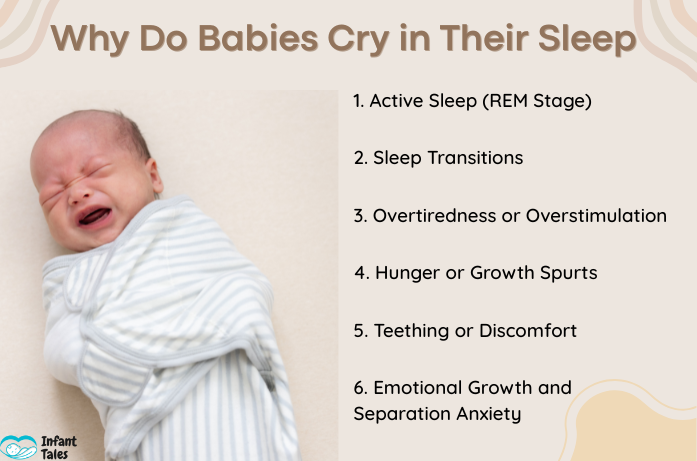
Why Do Babies Cry in Their Sleep?
If your question is “Why do babies cry in their sleep?” the answer will be that there are several normal explanations for this phenomenon. Most of them are a part of the healthy growth and development process.
According to Children’s Hospital Colorado, short cries during sleep are common because infants spend more time in lighter, active sleep stages.
1. Active Sleep (REM Stage)
A baby typically spends most of his time in REM or “active sleep,” when his brain is busy processing new experiences. During this time, you may notice movements, smiles, or even mild crying. This is a natural part of his baby’s sleep cycle and is not a cause for concern.
2. Sleep Transitions
For babies, the shifts from light to deep sleep can be quite challenging. Your baby might whimper or fuss very briefly during these transitions. These moments are often more pronounced during baby sleep regression phases when developmental leaps start interfering with rest temporarily. As Pathways explains, this is often more noticeable during developmental leaps or sleep regression phases.
3. Overtiredness or Overstimulation
It is the case that sometimes babies just cannot be convinced to fall asleep after too much excitement before bedtime or when a nap is missed, so they cry in their sleep due to restlessness or frustration.
4. Hunger or Growth Spurts
Babies have periods of rapid growth, particularly during the first year of their lives. The sudden increase in hunger or changing breastfeeding schedules can lead to crying at night even when the baby hasn’t completely woken up.
5. Teething or Discomfort
Teething pain, gas, or a wet diaper can all cause your baby to cry out in sleep. A quick check for comfort can often solve the problem.
6. Emotional Growth and Separation Anxiety
Around 8 to 12 months, babies start recognizing distance and absence meaning they might cry in their sleep because they miss you. It’s a normal part of emotional growth and learning trust.
The Science Behind Baby Crying in Sleep
Understanding how the baby sleeps will help to comprehend Baby Crying in Sleep. Newborns and infants spend almost half of their sleep time in REM which is considerably more than adults. The Sleep Health Journal notes that brief vocalizations or cries during REM indicate active brain development and memory processing.
Their bodies are learning to transition between stages smoothly. So, those midnight cries often mean their little brains are busy growing, not suffering.
When Baby Crying in Sleep Is Normal and When to Call Your Doctor
Most of the time, Baby Crying in Sleep is a normal developmental behavior. However, if the crying becomes unusually frequent, intense, or accompanied by other symptoms, it’s time to get professional advice.
When to call your doctor:
- Crying of a persistent and high-pitched nature that does not stop
- Crying with fever, vomiting or strange behavior being present simultaneously
- Difficulty in breathing or changes in feeding and sleeping patterns
- Baby being abnormally sluggish or hard to rouse
A quick trip to the doctor can take out the fear of conditions like reflux, ear infections, or other discomforts and give the assurance that your baby’s sleep health is good.
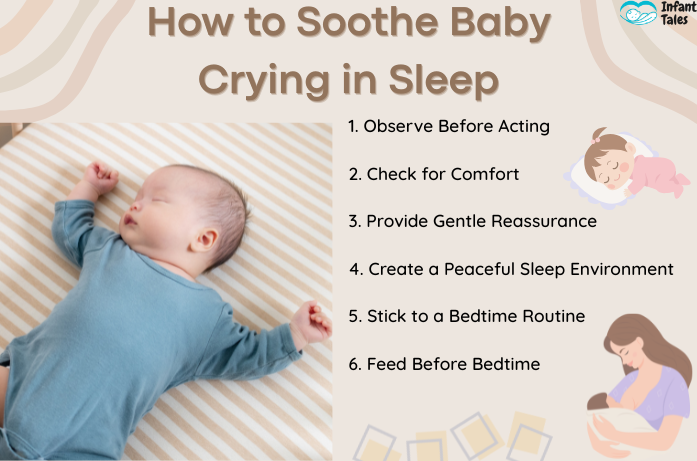
How to Soothe Baby Crying in Sleep
It is not necessary to wake your baby up when he/ she cries in sleep. Here are some soft techniques to calm the baby crying in sleep:
1. Observe Before Acting: Sometimes babies self-soothe and fall back into deeper sleep within moments. Wait a few seconds before intervening.
2. Check for Comfort: Ensure your baby isn’t too hot, cold, or in need of a diaper change. Environmental factors are common baby crying while sleeping causes.
3. Provide Gentle Reassurance: A soft “shh” sound, gentle pat, or light touch can help calm your baby without waking them fully.
4. Create a Peaceful Sleep Environment: White noise machines, soft lullabies, and dim lighting can encourage deeper, more restful baby sleep cycles.
5. Stick to a Bedtime Routine: A consistent pre-sleep ritual a warm bath, soft music and a cuddle, signals that it’s time for rest, reducing baby sleep regression episodes.
6. Feed Before Bedtime: A full tummy helps babies sleep longer stretches, minimizing hunger-related crying during the night.
These soothing methods not only comfort your baby but also teach them to feel safe and secure during sleep.
Emotional Connection: Crying Is Communication
Crying is more than just noise, it’s your baby’s first language. Through tears, babies express hunger, discomfort, fear, or simply the need for closeness. Baby Crying in Sleep is often part of emotional processing, as your little one’s brain sorts through new experiences and sensations. According to the La Leche League UK, responding sensitively to crying helps babies build emotional security and stronger attachment.
When you respond with calm reassurance, a gentle pat, soothing words, or your presence, your baby learns that they are safe and understood. This consistent comfort nurtures emotional security, strengthens trust, and builds the foundation for lifelong bonding and resilience.
Parent Self-Care: You Matter Too
Nighttime crying can drain even the most loving parent, and that’s perfectly normal. Fatigue, stress, and disrupted sleep can impact your emotional well-being, making it harder to stay calm when Baby Crying in Sleep happens. Remember, caring for yourself is also caring for your baby. Share night duties with your partner, nap when your baby naps, and accept help from family or friends when offered.
A well-rested, supported parent responds more patiently and effectively. Don’t hesitate to seek reassurance from your pediatrician or parenting communities, you’re not alone. This phase will pass, and you’re doing wonderfully.
FAQs About Baby Crying in Sleep
Q1: Why does my baby cry in her sleep but not wake up?
This often happens during active sleep (REM). Your baby’s brain is processing experiences, and the crying usually stops within seconds. It’s perfectly normal.
Q2: Should I wake my baby if she’s crying in her sleep?
Not always. Unless your baby seems distressed, it’s best to observe first. Many babies soothe themselves back to sleep naturally.
Q3: Could Baby Crying in Sleep mean something is wrong?
Occasional crying is normal, but if your baby’s crying becomes frequent, intense, or paired with other symptoms like fever or poor feeding, consult your doctor.
Q4: Can teething or growth spurts cause crying during sleep?
Yes, teething pain and hunger from growth spurts are common baby crying while sleeping causes. They usually resolve as your baby adjusts.
Q5: How long does this phase last?
For most babies, sleep crying improves as their nervous systems mature usually between 6 to 12 months.
Conclusion: Every Cry Has a Reason and Every Parent Learns with Love
Hearing Baby Crying in Sleep can tug at any parent’s heart, but it’s usually a part of healthy development. Most babies cry briefly during sleep transitions, dreams, or growth phases.
Your patience, comfort, and love are the best remedies. As you learn your baby’s rhythms, those midnight cries will become less mysterious and more a reminder of how beautifully your little one is growing.
Follow Infant Tales for more baby care tips, real parenting stories, and expert-backed guidance to help you through every beautiful stage of your little one’s growth.
Disclaimer: This article is for informational purposes only and does not replace medical advice. Always consult your pediatrician if you have concerns about your baby’s health or sleep patterns.
